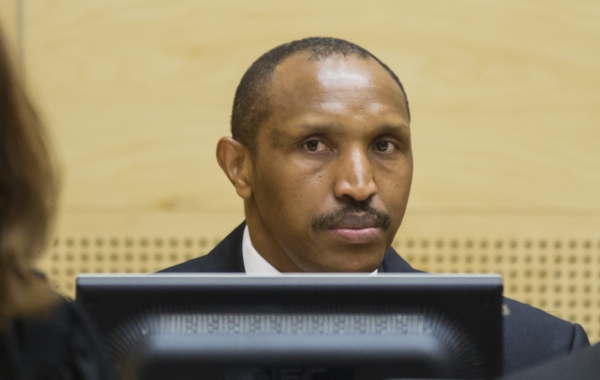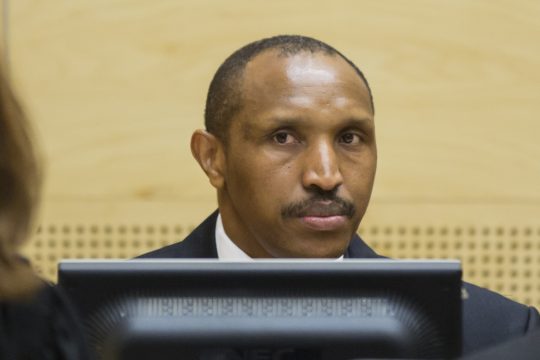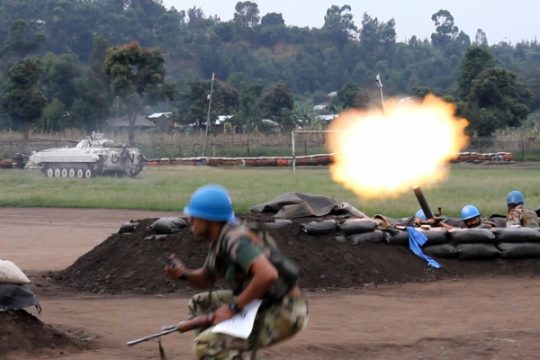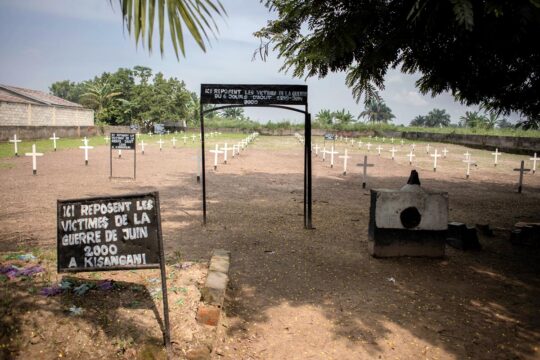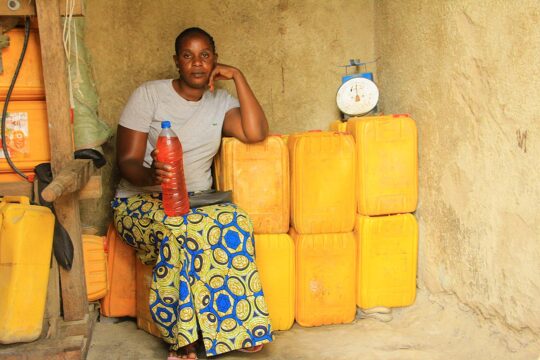Congolese ex-militiaman Bosco Ntaganda, on trial at the International Criminal Court (ICC) since September 2015, has gone on hunger strike to protest a Court decision restricting his visitors. Ntaganda, who was second-in-command of the rebel Patriotic Forces for the Liberation of Congo (FPLC), is charged with war crimes and crimes against humanity committed in Ituri, eastern Democratic Republic of Congo (DRC) in 2002 and 2003. He has been held in the ICC jail in The Hague, Netherlands, for 36 months.
On September 13, Bosco Nataganda addressed his judges by videoconference. Speaking in a tired voice and wearing headphones to hear the translation into Kinyarwanda, he said he didn’t want to leave the prison and that he felt weak after six days on hunger strike. “He has not eaten since September 7,” explained his lawyer Stéphane Bourgon. It was on September 7 that judges renewed restrictive measures put in place a year earlier after prosecution claims that Ntaganda was intimidating witnesses through intermediaries that he called on the phone from prison. He allegedly mentioned two protected witnesses and said that one of them should be “silenced”. Since then, his visits have been restricted, his phone conversations monitored, and he is allowed only one hour a week to talk to his mother and his wife. “I am a revolutionary,” says Bosco Ntaganda in a message read out in court by his lawyer, “and I am not afraid to die”. He complains that his judges just believed the prosecution allegations without any trial, and says this is “proof that everything happening here is just a show”.
Taking the Court hostage?
Ntaganda has been held in The Hague since March 23, 2013, after he left fighting in Goma and handed himself in to the United States embassy in Kigali. He was then transferred to the ICC. He complains he has not been able to see his seven children again. Three of them are supposed to come for Christmas, but there are difficulties to obtain passports and visas, explained head of ICC judicial services Marc Dubuisson at the hearing. There are some “financial difficulties”, he said, but the Court “has set aside a certain sum for this visit”. ICC member States refuse to include family visits to the Accused in the budget, so a special fund has been set up with voluntary contributions. Added to these difficulties, Ntaganda will only be able to see his children for four hours a day, because the measures imposed by the judges require interpreters to be present to monitor the conversation. He is also not allowed to see his wife in private. “I am forbidden to find support and comfort in my wife’s arms in private,” he complains.
The prosecution, however, says he is manipulating the Court and trying to take it “hostage”. “Boycotting hearings cannot be considered a legitimate or legal means” to protest the decision, said the prosecuror Dianne Luping, who asked the Court to impose “sanctions” and “fines” so that “the Accused does not take control of the hearings”. Presiding judge Robert Fremr tried to enlighten the former militiaman, explaining to him that the measures “aim to prevent potential prejudice” but that they could change, notably when the prosecution has finished presenting its witnesses. The judge also assured Ntaganda that he was considered innocent until proven guilty. Since the start of the trial on September 2, 2015, the prosecution has called around 30 of the 89 witnesses on its list. Hearings dedicated to the prosecution are expected to continue throughout 2017, according to a Court document. “I respect you, for as well as being judges you are older than me, so I owe you a lot of respect,” said Ntaganda. But he says he will not return to the hearings, and that he is “not able to continue following the trial proceedings without having the right to see my wife and children”.
30 witnesses in a year
Ntaganda, who is accused of crimes against humanity and war crimes for murder, attempted murder, rape, sexual slavery, using child soldiers under 15, forced transfer of populations, attacks against protected property, looting and destruction of property in Ituri, eastern DRC, in 2002 and 2003, has so far been present at all his trial hearings. He was the second-in-command of the FPLC, the armed wing of the Union of Congolese Patriots (UPC), a militia supported by Uganda and then Rwanda. Bosco Ntaganda is also alleged to have killed the priest Boniface Bwanalonga with several shots to the head and, with his bodyguards, captured three nuns who were subsequently raped by his militiamen in his apartments at the Kilo Moto goldmine. He was dubbed the “Terminator” to reflect his methods. The prosecution says he aimed to take control of Ituri, whose rich deposits of gold, diamonds and coltan fueled 20 years of war.
Since the trial opened on September 2, 2015, the prosecution has called some 30 witnesses to the stand. They have included forensic experts charged with identifying mass graves, such as Dr. Derek Congram. This expert went in 2014 at the prosecution’s request to crime sites, including the Church of Sayo. But he explained to the Court in early September that he had not, several years after the events, been able to localize some of the mass graves mentioned by witnesses. Several other experts also testified before him, including Robert Garreton, former Special Rapporteur of the UN Secretary General on human rights abuses in the DRC, and Kristine Peduto, who was the MONUC (UN peacekeeping force) person in charge of demobilization from 2002 to 2005. Anneke Van Wounderberg, a senior Africa researcher at Human Rights Watch (HRW), has in 17 years of investigations in the DRC produced several reports and met some 40 warlords including the “Terminator”. The first time, she recalls, was in Goma in November 2010. Last June she described to the judges a warlord who was “evasive” and would not look her in the face. “When I asked him questions about Father Boniface Bwanalonga, I was surprised,” she said. “He responded very quickly `I do not know him`. When I said that he was the priest of Mongbwalu, well known in the region and had been captured by his troops, he again repeated `I do not know him`. And I remember that at the time, I wrote in the margins of my notebook `he is lying`.”
Closed doors
Many victims have testified in the Hague, as well as FPLC fighters, but most of their testimonies have been heard behind closed doors. In June, one fighter spoke of an attack on Songolo in summer 2002. “We knew that our enemies were the Lendus and the Ngiti,” the witness told the Court. “We got there and we drove them out. And we were told to go from house to house and look for people. If we found enemies in the house, we were supposed to kill them. We killed several people in Songolo.”
“Who gave the orders?” asked the prosecution. “We were told that it was Afande Bosco who had given those orders,” came the reply. (Afande is a term used to designate officers). Another witness said Bosco Ntaganda gave these orders with a Motorola telephone. He said Tango Romeo, which was Ntaganda’s radio code-name, “could communicate with all the commanders of the UPC”. Witness P888 spoke of the looting, saying they were supposed to steal valuable items. “We would hand over all these valuable items to the commanders,” said the witness. “We would even go into shops and take all the merchandise, for example, biscuits, sardines and clothing.” During another hearing, a woman victim who was a gold trader listed her losses. “I lost 4,920 dollars in cash,” she said. “I also lost gold with a value of 53.5 grammes, 12 pairs of trousers, 14 shirts, 7 pairs of shoes, 5 pairs of sandals. I lost a Phénix bicycle and my house was destroyed. It was a large house that could receive people, a house built with 22 sheets of corrugated iron.” The next witness in this case will also be a victim.
The judges have decided to continue the trial even without the presence of the Accused. But they ordered the Registry to allow him to see a psychologist and to speed up procedures so his family can visit The Hague.



